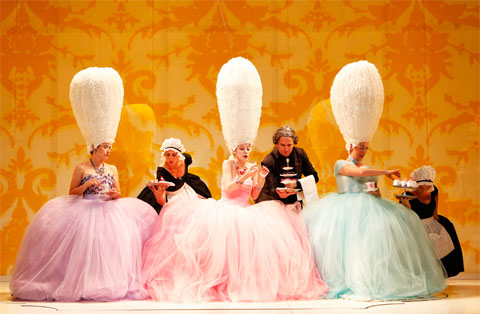
BAAA! David Adjmi's Marie Antoinette negotiates hairpin turns among satire, low comedy, surrealism,
and dark night of the soul before delivering a haunting wake-up call. |
Last year, dramatist David Adjmi raised a stir with a site-specific tea party called Elective Affinities, in which four-time Tony winner Zoe Caldwell held court in an Upper East Side townhouse, spinning a small audience into her web of entitlement. Adjmi is at it again, focusing this time on a less perceptive if better-known representative of the one percent, the Austrian-born child bride of Louis XVI. Marie Antoinette, in a world premiere co-presented by American Repertory Theater and Yale Repertory Theatre (at the Loeb Drama Center through September 29), is a mash-up of satire and sympathy, techno and classical, splendor and ash, at the center of which is the famously ice-cream-coiffed proponent of cake. It's a wild ride toward the chopping block in which the mood darkens as both Marie's hairdo and her bubble deflate.
The play begins in grand style with Marie, as puffy and trembly as a soufflé, and her coterie lined up beneath towering wigs that look like looming white cacti (and are affixed to wires as if they were puppets). Before set designer Riccardo Hernandez's chameleonic, Versailles-inspired walls, a stiff trio of servants dispenses heavily frosted sweets as the women's chat runs from Marie's somewhat sanitized passion for Nature to the suffocating aspects of being perpetually on display. When one companion complains of her kids' penchant for pastry and rebellion against a healthy diet, the titular royal airily admonishes — well, you can guess what she says (even if she never really said it). Then, boom, the party's over and the wigs rise heavenward as their wearers sink into a hole in the floor. Marie, at least, will fall farther — into prison, a sea of despond, and an afterlife in which, despite the tutelage of a Robespierre-invoking guard and a talking sheep, she remains a bit bewildered by what she did to piss the masses off.
It doesn't take a social historian to point out the catalytic parallels between the boil-up to the French Revolution and the economic outrage that spawned today's Occupy movement. Clearly Adjmi's play, which he penned in 2006, was ripe for production — even if it hadn't scored one as theatrical as the history-hopping combination of elegy and flash rocking the ART. Directed by Rebecca Taichman, with bristling choreography by Karole Armitage to cover Marie's numerous changes of dress, the staging negotiates the play's hairpin turns among satire, low comedy, surrealism, and dark night of the soul before delivering a haunting wake-up call.
Adjmi, though he paints Louis as an abstracted boob, does not demonize Marie, whose insular upbringing, limited education, and indoctrination into the divine right of kings did not prepare her to be anyone else than, in Brooke Bloom's feisty rendering, a naïve but not mean-spirited child diva with hints of Lucille Ball and Lady Gaga. As the play progresses from court intrigue to staged pastorale to life on the lam and in the big house, she downsizes from a gilded to a dirtier cage while struggling to comprehend everything from Rousseau (the inspiration for her turn as a shepherdess tending perfumed sheep) to her scurrilous rep. But it's the system, not the woman being pushed and prodded into Gabriel Berry's inventive costumes, that's the villain here.